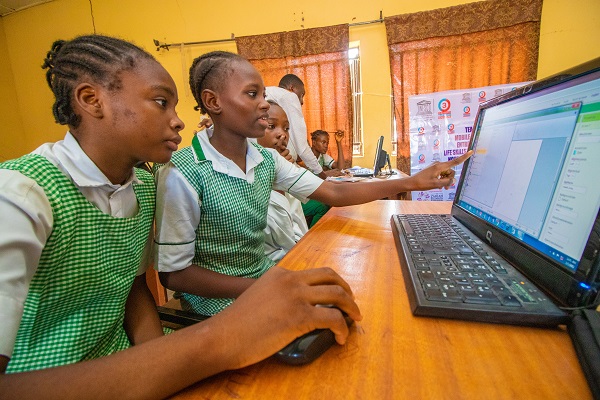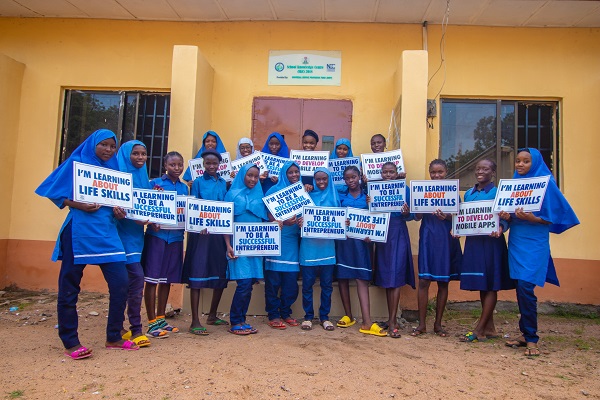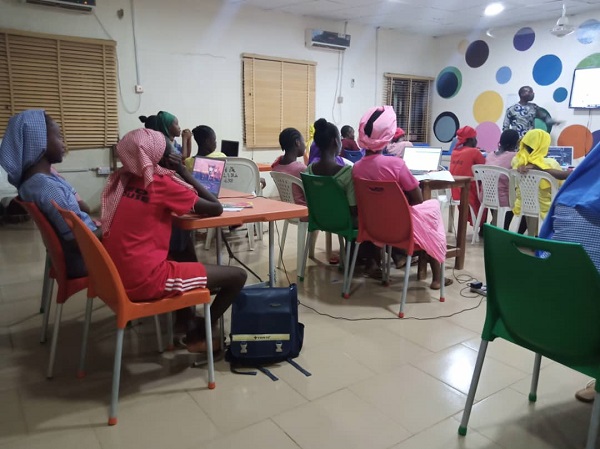
As the world commemorates the International Day of the Girl-child today, October 11, 2021, with the theme ‘Digital generation. Our Generation’, the importance of girl-child education cannot be overemphasized, especially with the ever-increasing pain caused by the high rate of insecurity in Nigeria.
There is a need to use education as a weapon for empowerment, thereby changing the crafted “helpless” mentality in the girl child early. Educating the girl child should be a priority in every society that desires to see a change and a developed economy.
Keying into the above, the United Nations Educational, Scientific and Cultural Organization (UNESCO) under its girl child empowerment training program on Mobile App Development, Entrepreneurship and Life Skills built the capacity of 75 school girls between the ages of 12 to 18 years in Adamawa State to use Information Technology (IT) to solve real-life challenges in their community.
Speaking in an exclusive chat to our correspondent, the executive director, The Zariah Elizabeth Foundation (TZE Foundation), Mr. Akindayo Akindolani, said digital skills training aims to build up the capacity of secondary school girls starting from the refresher course, mobile app development, entrepreneurial and life skills.
“It has been observed that Information and Communication Technology are not only a significant factor in the performance and growth of economies, but they also represent a novel and effective tool to help advance sustainable human development and women and girls have a lot to contribute towards this achievement if given the agency.
“The project will, therefore, contribute in bridging the gender digital divide by reducing the stark gender inequality in terms of digital access, ownership, digital fluency as well as the capacity to make meaningful use of the access to technology. It will also ameliorate the socio-cultural norms that restrict access for women and girls,” he said.
Akindolani averred the students were paired with two mentors – technical and entrepreneurial facilitator (business mentor) to teach the students both mobile apps development and entrepreneurial skills.

In her remarks, the UNESCO Abuja, national programme officer, Ms Ngozi Amanze, said the project directly aligns with the theme of this year’s International Day of the Girl-Child – ‘Digital generation. Our generation’.
She said the theme recognizes the profound transformations that have taken place as many countries turned towards high-tech solutions to ensure continuity of learning during the COVID-19 pandemic, saying the celebrations will give insights into what this means for girls, who due to the gender digital divide are more likely to be missing out on learning opportunities.
According to her, gender equality has always been one of UNESCO’s global priorities as the organization addresses gender equality through gender mainstreaming across its programmes and operations, and implementing gender-specific projects.
Amanze, however, said with COVID-19 threatening to reverse the gains made on girls’ education, UNESCO and Technovation, one of its Global Education Coalition members teamed up to equip young girls with the skills to become tech entrepreneurs through Mobile App development, adding that investing in girls’ education is a smart investment.
“The training has demystified computer coding for the girls. It has built confidence in them and made them realize that women and girls can pursue careers and thrive in STEM. Some of them testified to this assertion in their interviews and they are more than willing to take on the world of STEM. The training equipped them with life skills such as critical thinking skills to identify some of the real-life challenges in their immediate communities, the solutions to such challenges and developing Mobile Apps to address those solutions.
“These could be seen in the kind of Mobile Apps they developed; ranging from security apps to alert security officials in case of kidnapping and abduction, emergency health response, menstrual health hygiene among other solutions. They also learnt entrepreneurial skills, financial literacy and developing their business plans. This would enhance their economic security,” she added.

In his remarks, one of the facilitators, a computer science lecturer at the Modibo Adama University, Yola, Mr. Atiku Ahmed Umar, said the students developed six applications to solve real-life challenges in their immediate environment during the training.
Listing the applications developed, he said they include, the Emergency Response Health App – this is a response App where users when sick depending on the severity can call a doctor, an EMT or the hospital is contacted for medical consultation and treatment. This is to address the high mortality rate from wrong diagnoses, self-medication, and distance; Security – this App when installed sends the user’s location to emergency contacts when they call, this happens after the user activates the alarm which then sends an SOS to the emergency contacts. This addresses the high level of insecurity and helps law enforcement agencies track down missing persons or those in danger faster.
Other apps developed include Clean Environment – an app that lists out common items that could be recycled and shares DIY projects to convert trash to treasure. This is to combat the growing environmental pollution and build cleaner and healthier communities; Tourism – It is the App that helps both tourists (national and international) by promoting hidden and attractive places in Adamawa and Nigeria at large. This app talks more about sectors in Adamawa state: a. recreational centres b. historical sites c. monuments d. museums e. natural wonders f. hotels g. medical centres.
Others are the Girl-Child Health and Hygiene (menstruation) – This is a repository App that helps girls and women in their period keep track during their cycle. It serves as a menstruation planner with guides on medication, sanitation and other tips during the cycle period; and the Reading App – an app that teaches kids how to pronounce correctly and also read aloud the alphabets representing each letter.
In her comments, another facilitator, Miss. Blessing Ibe from the Business Coach Grow, with Data Foundation, Yola, said the weeks of training have empowered the girls, widened their horizons and broadened their knowledge scope in mobile app development, entrepreneurship and life skills such as effective communication, self-awareness, creative thinking, empathy, leadership, work ethics, critical thinking, time management, stress management, and decision making.
“The benefit of life skills training was to make the trained beneficiaries aware of themselves and to support them in life as they grow. This has helped instill in them the necessary agility and ruggedness in scaling many hurdles life brings towards them and in achieving excellent career or business life,” she added.
Speaking on the training, the students unanimously agreed it built their capacity and equipped them with relevant skills for easier assimilation and life application of the lessons learnt.
In her remarks, Aishat Bello, a student of Federal Government Girls College, Yola, said she learnt how to use a computer and was able to develop an app for enhanced security.
“The app I created is about security, like the problem we are facing in this Adamawa about security. Seriously, we need more security that was why I created the app. You can use the app to get help when you are in danger,” she said.
Another student, Rejoice James, said after the training, she now understands her community better and has gained perspectives and how to spot challenges to provide solutions.
She further said she can now conduct market research to ask potential users what their solutions should feature and explore the viability and feasibility of their solutions, adding she now knows the basics of writing a business plan for her projects.


